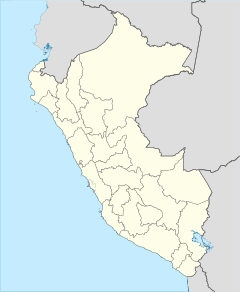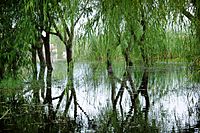Conache facts for kids
Quick facts for kids
Conache
|
|
|---|---|
| Country | |
| Region | La Libertad |
| Province | |
| District | Laredo |
| Founded | mochica |
| Government | |
| • Type | Mayor–council government |
| Elevation | 89 m (292 ft) |
| Time zone | UTC-5 (PET) |
| Area code(s) | 044 |
| Demonym | (Spanish: laredino/a) |
| Website | Municipality of Laredo |
Conache is a small town in Peru. It is located in the Laredo District, about 14 kilometers (9 miles) from the city of Trujillo. Conache is part of the La Libertad Region.
This town is built on an ancient site. It was once home to the Moche culture long before the Inca Empire. Conache has sandy areas and is near the Moche River. This river helps the land, making it good for farming and raising animals. You can still see old farming areas and paved water channels there. One of these areas is called "The Devil's Pocket."
Contents
History of Conache
Conache is in the Moche River valley, which has always been good for farming. In ancient times, the Moche people used special irrigation systems called huachaques. These were like sunken gardens or wetlands. They used them to raise animals and grow plants that needed a lot of water.
When Spanish explorers arrived, they also found Conache to be a great place for farming. They grew food for the growing markets in Trujillo. Today, Conache is part of the Laredo district. It is about 7 kilometers (4 miles) from the city of Laredo.
What Conache Produces
Conache is mainly a farming town. People here grow many different crops. These include corn, beans, and sugar cane. They also grow various vegetables.
Besides farming, people in Conache also raise animals. They grow plants to feed their animals. Both large animals, like cows, and smaller ones, like chickens, are raised here.
Fun Festivals in Conache
- Carnival of Conache is a lively festival held every year. It takes place in Conache, near Trujillo. Carnivals are big celebrations with music, dancing, and parades.
During the Carnival of Conache, there are many fun activities. A queen is crowned, and there's a big party. People often enjoy an old traditional drink called Chicha during the celebration.
Visiting Conache
- Lake Conache is a popular spot for visitors. For a long time, this lake only appeared during the rainy season. It would dry up a few months later.
However, things changed after a big irrigation project called Chavimochic. Water from this project started to leak into the ground. This caused the water level under the ground to rise. Now, Lake Conache has water all year round and is growing bigger!
See also
 In Spanish: Conache para niños
In Spanish: Conache para niños
 | Jackie Robinson |
 | Jack Johnson |
 | Althea Gibson |
 | Arthur Ashe |
 | Muhammad Ali |



